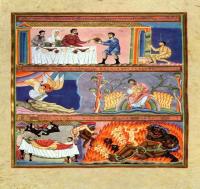
Today we have another well-known parable which Jesus told, which is unique in that he named a character in the story. The poor man was called Lazarus, which means “God is my help.” The rich man was not described as cruel or wicked; he was merely taken up with enjoying good living and did not see that he was responsible for Lazarus’ welfare. In the past there used to be a back stairs for servants, so that they would not be seen by the family. Dives, as the rich man is sometimes called, may have similarly considered Lazarus beneath his notice. On the other hand, after death he did seem to know his name.
Amos, who preached to the Northern Kingdom of Israel, experienced the same indifference to the plight of the poor. “The ruin of Joseph” refers to the moral decline of the society where the tribe of Joseph was prominent. There seems to have been a complacency among the wealthy, possibly because riches and material comforts were often seen to be signs of favour from God.
St Louis, King of France from an early age, was concerned about the poor. Wherever he went, 120 poor people were fed and he would often see that they were given food before he himself ate. Sometimes they would be invited to dine with him at his own table. He is a good example of someone who knew that his duty was to care for those less fortunate than himself.